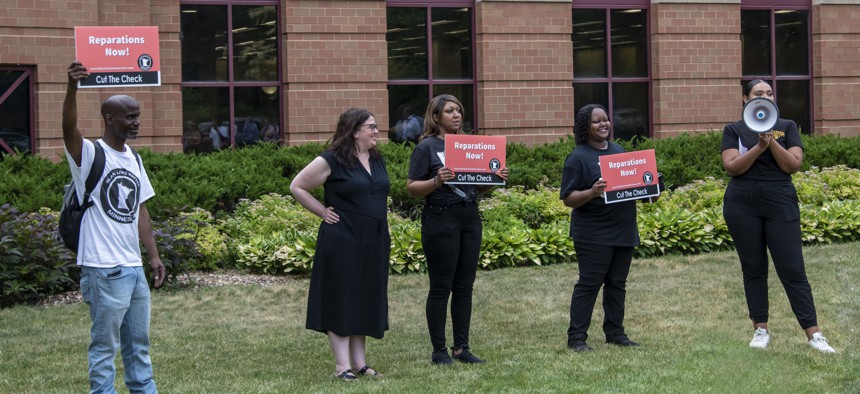Connecting state and local government leaders
Localities are devising programs to provide redress for racial discrimination. But implementing them has brought out the critics.
The movement for cities to provide reparations to African American residents for decades of racially discriminatory policies and practices has gained momentum this spring. But making good on the promise is likely to be a lengthy, complicated and controversial process.
In cities such as St. Louis; Evanston, Illinois; Providence, Rhode Island; St. Paul, Minnesota; Asheville, North Carolina; and Berkeley, California, reparations programs have taken shape over the past year and are now moving into new phases.
Earlier this month, St. Louis Mayor Tishaura Jones signed a bill allowing taxpayers to voluntarily donate to a reparations fund. Her administration characterized it as a “first step on a topic that needs careful attention and deliberate, studied implementation.” But when the city’s aldermen advanced the measure, some expressed concern about the lack of detail about who would be eligible to receive the funds or how the application process would work.
Evanston is much further along in the process of disbursing funds from its reparations fund, the first one created and launched. That also means its program is attracting more scrutiny and criticism. Under the program, Black residents who lived in Evanston between 1919 and 1969 are automatically eligible for $25,000 grants to cover mortgages or home repair and upgrade costs. Almost immediately, critics said that the limits on what the money could be spent on made it “fake reparations.”
The Evanston initiative also has come under fire for its limits on who is eligible for the program. For example, people who moved away from the city because they were denied the opportunity to purchase a home cannot apply for grants. Evanston officials say the housing voucher program is just a first step and that the city felt the need to prioritize people who personally experienced past discrimination.
Meanwhile, conservative activist organizations have criticized reparations programs in Evanston and elsewhere, and are laying the groundwork for legal challenges across the country. They argue that the initiatives unconstitutionally discriminate on the basis of race.
Committees and Commissions
Nevertheless, reparations programs continue to spread. In March, the Berkeley City Council voted to consider hiring a consultant to help establish a reparations process.
In a report recommending the move, city council member Ben Bartlett said a wide spectrum of discriminatory actions against African Americans justify redress. “The spectrum,” he wrote, “includes Jim Crow, voting restrictions, redlining, denial of remedies in civil court, inability to join labor unions, employment discrimination, criminal justice abuse, mass incarceration, denial of access to capital by lenders, denial of federal land grants, and housing loan guarantees, concentrated exposure to pollution, and inequitable access to education.” Many such actions were sanctioned by federal, state and local governments, Bartlett said.
Some cities are seeking to learn from what others have experienced in setting up reparations systems. Last month, Providence, Rhode Island, Mayor Jorge Elorza signed an executive order creating a commission to study what other cities have done and make recommendations for implementing its own program. The effort is part of the middle phase of the city’s “Truth-Telling, Reconciliation and Municipal Reparations” initiative.
“By engaging those who have been directly impacted by actions outlined during our Truth-Telling phase, this framework demonstrates that history isn’t something that just happened in the past but is actively shaping present-day outcomes for African heritage and Indigenous Providence residents,” said Elorza.
Likewise, St. Paul’s reparations committee is conducting a series of community sessions to gather feedback on their work to set up a commission to address ways to provide compensation for historical disparities in the treatment of its residents.
Laboratories of Experimentation
In at least one case, a town is hoping to become the recipient of reparations funds rather than the issuer of such payments. Mayor Keisha Currin of Tullahassee, Oklahoma, says the town once thrived with commercial and civic activity. Now it has only 83 residents, and many of its buildings and homes are dilapidated or gone. The slow decline was a direct result of government policy, Currin has argued, ranging from enacting Jim Crow segregation laws to failing to prevent violence against African Americans.
Currin, who has a full-time job at the U.S. Veterans Affairs Department, recruited Cymone Davis, a former educator in Kansas City, Missouri, to move to Oklahoma and help in the effort. In 2020 Davis received a grant under the Tulsa Remote program, which offers $10,000 payments to out-of-state residents who agree to move to the city. She later became Tullahassee’s town manager.
Currin is a member of Mayors Organized for Reparations and Equality, an alliance dedicated to pushing municipal reparations efforts. “Our coalition stands on the belief that cities can—and should—act as laboratories for bold ideas that can be transformative for racial and economic justice on a larger scale,” the group’s mission statement reads, “and demonstrate for the country how to pursue and improve initiatives that take a reparatory approach to confronting and dismantling structural and institutional racism.”
There’s a long history of cities and states incubating policies and programs before they are implemented at the federal level. But some analysts argue that is a misguided approach when it comes to reparations. A national problem demands a federal government solution, they say.
“Once a political hot potato, the label ‘reparations' suddenly is being applied to a variety of acts of individual and community atonement,” wrote A. Kirsten Mullen and William A. Darity Jr. in The Washington Post last year. Mullen and Darity are the authors of From Here to Equality: Reparations for Black Americans in the Twenty-First Century. That stretches the term to the breaking point, they say.
Evanston’s experiment, for example, is “a good step for the city to take, but let’s be clear: This is a housing voucher program, not reparations—and calling it that does more harm than good,” Mullen and Darity wrote. True reparations for the economic harm done to African Americans, they argue, would cost $14 trillion and can only be accomplished at the federal level. States and localities simply don’t have the funds to implement meaningful programs.
Whether or not initiatives to provide financial redress to African Americans should all be labeled “reparations,” there is an increasing recognition among civic leaders that government at all levels has much to atone for. In his 2017 book The Color of Law, Richard Rothstein laid out the case that a series of official actions was decisive in creating a segregated America.
“Our system of official segregation was not the result of a single law that consigned African Americans to designated neighborhoods,” Rothstein wrote. “Rather, scores of racially explicit laws, regulations and government practices combined to create a nationwide system of urban ghettos, surrounded by white suburbs. Private discrimination also played a role, but it would have been considerably less effective had it not been embraced and reinforced by government.”

NEXT STORY: Why the infrastructure bill alone can’t solve digital connectivity challenges




